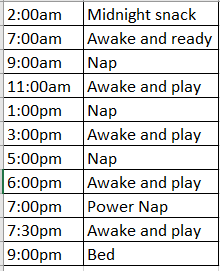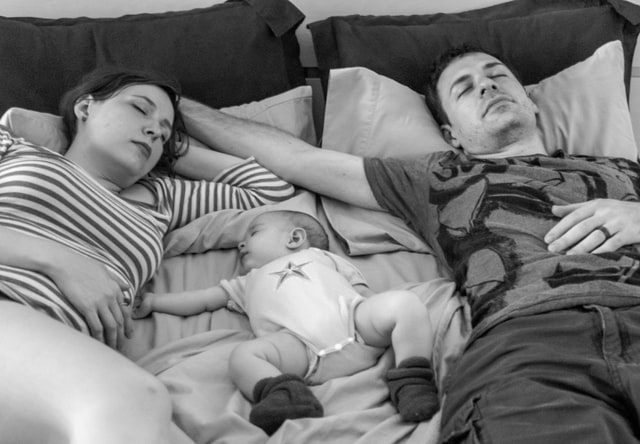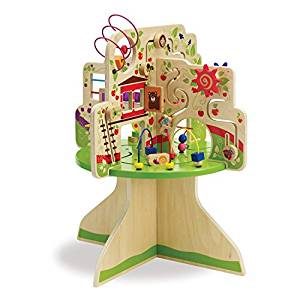Updated October, 2021
Ah, three months! I imagine your lives have started to settle into a routine that accommodates your little one. You have likely been able to see some of their personality shining through, which has probably been my favorite part of parenting so far. I love to see Monster becoming a little person, with all their likes and dislikes, quirks and opinions.
What to Expect
Around 3 months sleep should start getting a little easier. At night, your child will still likely tend to wake up at least once, though that should be all. Your baby should be able to stay awake about 2 hours between naps. Naps will be lasting anywhere from 30 minutes to 2 hours. They say this age should take 3-4 naps per day. Around 3 months, expect that number to be closer to 5 naps and at 6 months expect it to be closer to 3, maybe 4. In total, night sleep plus naps, your child should average about 14 hours of sleep per day.
Sleep Training According to Me
Now I personally use the term ‘Sleep Training’ to describe working with your child in any form to help them learn healthy sleep hygiene. Ultimately, this will look like them sleeping through the night without problem. To be very clear, Sleep Training, as defined by me, is NOT the cry it out method.
Sleep training is about balancing appropriate developmental expectations with the needs of your child. It is about being responsive and supportive. Most of all, it is about helping you move towards a sleep routine that makes sense for you and your family.

3-6 Month Sleep Practices
Keep in mind some of the tips I’ve already gone over in previous blogs about sleep. Continue to practice things like maintaining a routine and keeping night time quiet and calm.
Drowsy but Awake
If you weren’t already working on this, it’s time to commit to the practice of putting your child down while drowsy, but still awake. Sometimes this means even jostling them a bit so they know you are putting them down. You want them to have full bellies and clean diapers, but when you put them down, maybe their eyes are still a bit open. Maybe to start they are in a really light sleep, instead of one of those completely dead sleeps.
This may not always be easy, but helping your child learn to self sooth should start now. Give them a moment to fuss a little if they seem to be settling, but if they burst into full on tears, it’s completely okay to pick them up, sooth them, and try again. As I’ve said, I don’t really do the cry it out method. Sometimes having your partner put them down can be helpful as well.
Independent Sleeping
I think it’s important for your child to start practicing sleeping without you, especially if they haven’t already. This doesn’t mean you can’t co-sleep, if that’s what’s right for you. It’s more of an awareness that most people will not share a bed with their child forever. Make sure they feel comfortable sleeping in their own bed, wherever that might be.
Follow a Schedule
Routine, Routine, Routine. I can’t say it enough. Find a schedule that works for you and your family, get on it, and stick to it. I know when Rainbow Sprinkle was little I would wake them up at 6am so that they could get ready and play for an hour before we had to be out the door. Then they could power nap in the car on the way to school so I could go to work. Find a schedule that works well for your family and stick to it.
Habits to Avoid
There are always little habits to avoid, and we want to continue to keep on the right track. The goal with my overall approach is to have your child sleeping through the night by 6 months. We are so close now, but we still want to stop ourselves from falling into any poor traps.
Silence
Don’t tiptoe around your house every time your child goes down for a nap or to sleep for the night. Sound is a normal part of our worlds. Even better, making noise during nap time, where your child will have a chance to practice falling back to sleep on their own, is great. No whispering or sitting super still. Make sure you are still living your life so your child can get used to household sounds as well.
Pacifiers and Soft Toys
I will admit I am not a pacifier person. I highly dislike them and never gave them to either of my children. I also don’t do one single blanket or lovey for my children to get attached to either. I mean, Gaia forbid we don’t have one of those items when the kids need to sleep. Make sure you aren’t setting your child up for unnecessary dependence on external sleep aids. Our goal is to actually have our child learn how to sleep on their own.
4 Month Sleep Regression
I want to give you a quick warning about the 4 month sleep regression. If you felt like you were doing really well, had a routine, got down to one nap, and then suddenly your child is waking up more again, it is very likely this 4 month sleep regression. Even though it’s called 4 month, it can really happen anytime in this 3-6 month range.
If you do experience a 4 month regression, avoid falling into any bad habits. While disappointing and sometimes exhausting, we don’t want to take even more steps back than we already have. So stay consistent and keep with your schedule and practice.
Sleep Schedule
This sample sleep schedule is just that, a sample. I wanted to offer something you could follow. Just know that you may want or need to tweak this schedule to better suite you and your life. That’s totally okay. And again, at 3 months, they are going to need more naps. Towards 6 months, some of these naps will start falling away. At 6-9 Months we will aim towards dropping to just 2.5 naps a day, so know that those shorter naps will start to fade away.


Sleep Help!
Need support with getting your child on the right track for sleep? View my Postpartum Doula page where I can offer sleep training for you and your family, including a night’s reprieve if you just need some time to catch up.















